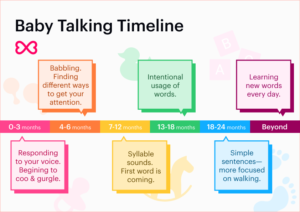It might be among the most anticipated milestones in a baby’s life: Their first word! Whether it’s “Dada” or “Mama” or something completely different, it represents that start of verbal communication and, for parents, a whole new way to connect with their little one. But when, exactly, do babies start talking? While there’s no specific age that applies to each and every child, there are some norms and research that provide insight into when early speech often begins
What are the early stages of speech?
Obviously, babies don’t go from silence to full sentences — speech develops over time in specific phases. According to the American Academy of Pediatrics (AAP), these stages generally look something like this:
Your Baby’s Talking Timeline

0-3 Months
At this point, what you’re looking for is your baby responding to you and your voice. They’ll likely also respond to your facial expressions. They may begin o coo and/or make vowel-like sounds such as “ah.” These basic sounds reflect their growing awareness of their ability to communicate and respond to voices they hear.
4-6 Months
At this point, most babies are babbling. You may hear some constant sounds from them as they gain more control over their tongue and throat. There is increased development in nonverbal communication here too. Your little one is starting to figure out all the ways they can get your attention, not all of them pleasant (think dropping things or yelling).
6-9 Months
Babbling often begins, with repetitive syllables such as “ba-ba” or “da-da.” While they might sound like real words, they typically aren’t linked to any meaning.
10-14 Months
This phase is the eagerly-anticipated time when most babies say their first true word — a word used consistently and in the right context, like saying “dada” to refer to their father.
18 Months
Toddlers typically have a vocabulary of 10 to 50 words and might even start using simple two-word phrases.
24 Months
Children often speak in short sentences and have a 50 to 300-word vocabulary, depending on the child.
Print out the talking timeline for your baby here.
When do babies use their first words?
Pediatricians often report that babies say their first word around 1 year, but there’s plenty of research to show that there’s a wide range of what doctors consider normal. The MacArthur-Bates Communicative Development Inventories (CDI), which is a measure often used in language development research, indicates that the median age for first words is 12 months, while about 10% of children say their first word as early as 8.5 months and 10% might not start talking until after 16 months, which is still considered within the normal range.
Is there such a thing as a word growth spurt?
Yes, parents might notice the aptly-named “vocabulary explosion” between 18 and 24 months. This is a phase when many toddlers go from learning a few words per week to learning several words each day. In fact, one study found that by 18 months, most children have a vocabulary of about 50 words and by 24 months, that word repertoire mushrooms to 200 to 300 words. By 36 months, many children use sentences with three to four words which are understood by people other than their parents.
What influences when babies start talking?
There are a few key factors that determine when babies start talking:
Verbal Interaction
The amount of language a child is exposed to is a major predictor in early language development. Babies who are routinely spoken to, read to, or surrounded by conversation tend to speak sooner and develop bigger vocabularies.
Health and hearing
If a child has a hearing issue, speech can be dramatically delayed. The Centers for Disease Control and Prevention (CDC) reports that about 1 to 3 in every 1,000 babies in the U.S. are born with detectable hearing loss, but newborn hearing screening can encourage early detection and treatment.
Bilingual homes
Babies who live in homes where more than one language is regularly spoken might initially mix up languages or show a different pattern of vocabulary development. Still, research shows that children who are bilingual typically have the same language milestones as babies in homes with one language.
Gender differences
Some research shows that girls might start talking earlier and have slightly larger vocabularies and more complex speech in the early months when compared with boys, but these differences usually disappear by preschool.
Here are even more ideas to help get your baby talking.
When should parents worry?
It’s important to understand that there is a wide range in what’s typical for speech development. Still, there are some signs that could hint at a language delay. According to the American Speech-Language-Hearing Association (ASHA), you might want to talk to your pediatrician if your baby isn’t babbling by 12 months, doesn’t say any words by 16 months or struggles to hear or follow simple directions. The good news? Early intervention can significantly improve outcomes, especially if delays are caused by hearing loss, autism, or other developmental disorders.
How can I support my baby’s language development?
There are plenty of ways! Starting in infancy, talk to your baby throughout the day as well as read aloud, use picture books and adopt expressive voices. Singing songs can also help introduce rhythm and new vocabulary. And, of course, be sure to respond to your baby’s babbling to encourage back-and-forth interactions that mimic conversations.




